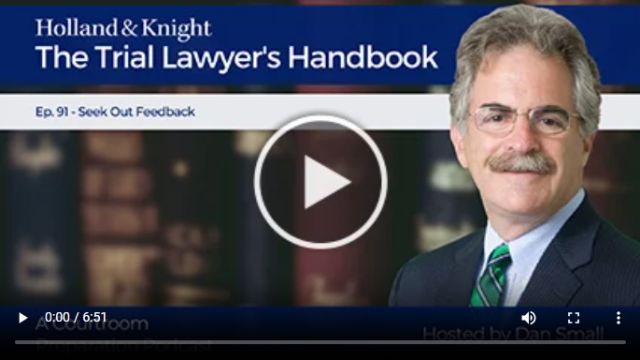In this episode of "The Trial Lawyer's Handbook" podcast series, litigation attorney Dan Small shares personal stories from early in his legal career that illustrate the invaluable role of experienced trial observers and honest feedback. Recalling his time at the U.S. Attorney's Office in Boston, he explains how casual gatherings of retired gentlemen helped them become expert critics who offered constructive advice that dramatically improved his trial skills. He also narrates a moment during a trial in Galveston, Texas, where he had the opportunity to sit down with court staff and listen to their feedback on this performance. These encounters taught him more about courtroom strategy and advocacy than formal education alone. The episode emphasizes the importance of seeking and valuing feedback in the challenging work of trial law and conveys a message of paying forward the lessons learned to help nurture the next generation of trial lawyers.
Listen to more episodes of The Trial Lawyer's Handbook here.
This podcast episode was adapted from Mr. Small's book Lessons Learned from a Life on Trial: Landmark Cases from a Veteran Litigator and What They Can Teach Trial Lawyers.
Podcast Transcript
Dan Small: When I moved to Boston to join the U.S. Attorney's Office Public Corruption Unit after my time with the Department of Justice in Washington, there was a great group of about a dozen retired gentlemen who had discovered the Boston federal courthouse as a source of endless fascination and great theatre. They'd gather every morning early in the courthouse cafeteria for breakfast (remember when courthouse cafeteria breakfast were cheap and good?). They'd review the court's published schedule, see what looked interesting and then split up among the different courtrooms to watch. At the lunch break, they would reconvene in the cafeteria and compare notes on what they had seen over lunch.
Over time, they had become expert observers. I befriended them, and they became an invaluable resource. They would tell me stories of what was going right and wrong in other trials. But it was when I was on trial that they were the most valuable. I would run down the cafeteria. "How did I do?" I would ask. And they would tell me straight out:
- "Mr. Small, Juror #6 doesn't believe this witness, hit him hard."
- "Mr. Small, maybe you should focus more on X than on Y."
- "Mr. Small, you need to do more to explain how this worked. They ain't buying it."
- "Mr. Small, in your closing argument, be sure to focus on ABC."
There is no way to put a value on what I learned from these fine gentlemen. But I already knew the value of feedback from experienced observers. I learned it in the Farmers Export grain elevator explosion trial that we've talked about in prior episodes. Think about a small Galveston, Texas, courthouse: At the time, it was just one judge, one clerk, one court reporter. When those three got together — as they did regularly — what would they talk about? Oh sure, sports, politics, whatever. But sooner or later, they'd talk about the trials that they'd been watching. So over time, the three of them became a committee of expert trial critiquers themselves, but often with no one to provide the critique to! What a waste!
After a month of trial in this case, no one expected the Farmers Export jury to come back with a verdict quickly. Yet there was nothing to do, nowhere to go. They could come back with a question at any moment, so I wandered the halls of the courthouse, nervous and bored. At one point, I walked past the door to the small, one-room library, and much to my surprise, I heard voices inside. In all my time in that courthouse, I had never seen or heard anyone else in that library. Curious, I opened the door.
Two years out of law school, certain basic principles were fresh in my poor brain. A big one was ex parte: A party should not have contact with the court without the other party present. Simple. So, when I opened the door to the library, I was horrified to find the judge, the clerk and the court reporter gathered around the old library table with a bottle of amber liquid and a deck of cards. My law school instincts said "run!" so I started to close the door.
Too late. Judge Gibson saw me and called out, "Mr. Small, come on in, pull up a chair!" Law school had also taught me when a federal judge issues an order, you have to comply. So now, now two basic law school teachings were in direct conflict. What to do? Which principle should I follow? Ex parte, or a judge's order? With great trepidation, I opened the door the rest of the way, went inside and pulled up a chair.
What followed was nothing short of incredible. For the next four hours, this panel of expert trial-watchers walked me through the entire month-long trial, step by step, and gave me honest feedback on virtually everything I had done. This was before we had online access to everyone's background, so I'm not sure they fully appreciated how totally inexperienced I was, but they suspected: "Well we were worried about you at first, but you came on strong as the trial went on!"
I had worked multiple jobs and gone into debt to go to law school, but the truth is, I learned more about trials in those four hours than I did in three years of law school. And those gentlemen didn't charge me a dime. I broke even at cards, drank their amber liquid and absorbed invaluable lessons.
I will never forget those four hours around that old library table. What we do as trial lawyers is important and challenging. We need to seek out — and value — feedback wherever it comes from. I owe debts of gratitude that I can never repay to those 12 retired gentlemen in the Boston courthouse cafeteria and to the library table committee — as I call them — in Galveston, Texas.
All I can do is try to pay it forward, as they did, as we all should, to other fledging trial lawyers, and hope that my advice helps. Thus, this podcast series. So please, pull up a chair, and go to the next episode.
The content of this article is intended to provide a general guide to the subject matter. Specialist advice should be sought about your specific circumstances.


